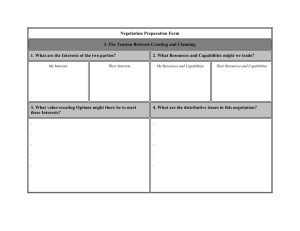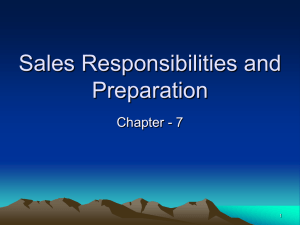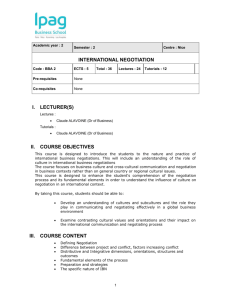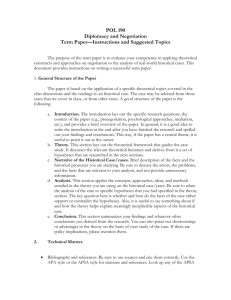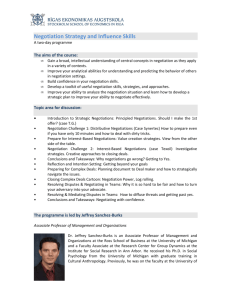Experience with a Multi-Stage Negotiation Roleplay Adam Baxter Co./Local-190
advertisement
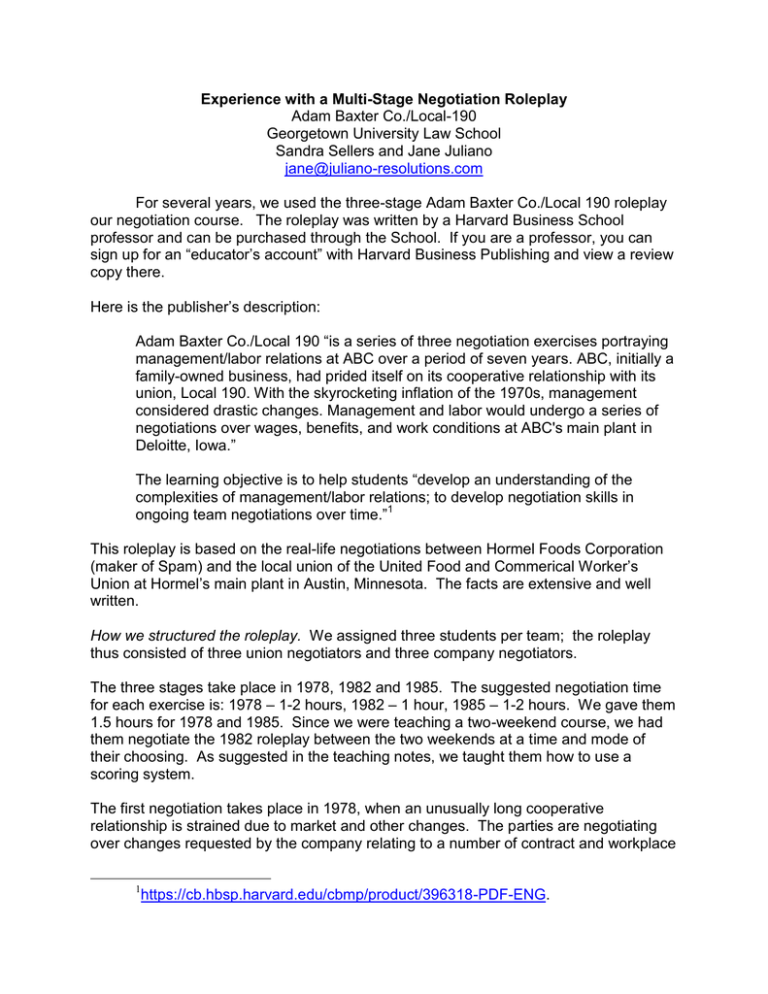
Experience with a Multi-Stage Negotiation Roleplay Adam Baxter Co./Local-190 Georgetown University Law School Sandra Sellers and Jane Juliano jane@juliano-resolutions.com For several years, we used the three-stage Adam Baxter Co./Local 190 roleplay our negotiation course. The roleplay was written by a Harvard Business School professor and can be purchased through the School. If you are a professor, you can sign up for an “educator’s account” with Harvard Business Publishing and view a review copy there. Here is the publisher’s description: Adam Baxter Co./Local 190 “is a series of three negotiation exercises portraying management/labor relations at ABC over a period of seven years. ABC, initially a family-owned business, had prided itself on its cooperative relationship with its union, Local 190. With the skyrocketing inflation of the 1970s, management considered drastic changes. Management and labor would undergo a series of negotiations over wages, benefits, and work conditions at ABC's main plant in Deloitte, Iowa.” The learning objective is to help students “develop an understanding of the complexities of management/labor relations; to develop negotiation skills in ongoing team negotiations over time.”1 This roleplay is based on the real-life negotiations between Hormel Foods Corporation (maker of Spam) and the local union of the United Food and Commerical Worker’s Union at Hormel’s main plant in Austin, Minnesota. The facts are extensive and well written. How we structured the roleplay. We assigned three students per team; the roleplay thus consisted of three union negotiators and three company negotiators. The three stages take place in 1978, 1982 and 1985. The suggested negotiation time for each exercise is: 1978 – 1-2 hours, 1982 – 1 hour, 1985 – 1-2 hours. We gave them 1.5 hours for 1978 and 1985. Since we were teaching a two-weekend course, we had them negotiate the 1982 roleplay between the two weekends at a time and mode of their choosing. As suggested in the teaching notes, we taught them how to use a scoring system. The first negotiation takes place in 1978, when an unusually long cooperative relationship is strained due to market and other changes. The parties are negotiating over changes requested by the company relating to a number of contract and workplace 1 https://cb.hbsp.harvard.edu/cbmp/product/396318-PDF-ENG. issues. You can use just this roleplay as the only stage of the exercise or have the negotiations continue in 1982 and 1985 as they did in real life. In the 1982 negotiation, only a wage clause is at issue, and if the parties do not agree, it will go to arbitration. For the 1985 negotiation, the negotiatiors assume that whatever they agreed to in 1982 is the wage amount (or you can provide an arbitration decision if the parties were at impasse in 1982). The 1985 negotiations are broad and contain more items. The parties’ contract is expiring and a strike is the BATNA. We did not tell the students that the negotiation was continuing until after they completed the 1978 negotiation. Some students had burnt bridges in the 1978 session, so they had to learn to deal with repeated negotiations in a continuing relationship. One teaching point is how compromises made in earlier negotiations about which one side or the other is still displeased tend to resurface in later negotiations. There is a documentary called “American Dream” (Prestige Films, 1991) about the actual Hormel negotiations, which you may want to show in class or mention to the class. The HBS teaching notes provide very extensive coaching on ways to debrief, and give ideas for how to incorporate the film into the course. We borrowed from the teaching notes and enjoyed the students’ comments and discussions. Today’s students are largely unfamiliar with unions. Some were stunned to see the hardships that the failed negotiations imposed on the parties, particularly the employees. All in all, students found the roleplay an extraordinary learning experience. When we used the roleplay in 2013, some of the students were able to research the real-life situation on the internet. We felt this may have reduced the educational opportunities from going through the roleplays and then seeing how it played out in reality afterwards. So you might not mention the actual Hormel case until the final debriefing.
